
Wacom Yuify:
Making the world a safer place for creators
Wacom Yuify is an innovative service designed to authenticate creators’ works by embedding invisible micro-marks into artworks, which prove how, when, and by whom each work was created. It started with the desire of our ‘sparks’. They wanted to protect the works creators have poured their passion and efforts into in order to create a world where creators can create with peace of mind.
Even though we may refer to it as ‘proof of creation’, what individual creators wish to record varies based on factors like region, culture, and creative practices. A dedicated cross-functional team known as the Extended Core Team (ETC) was even created to address the diversity and move forward with the development. We spoke to Ryoji Ishii from Business Finance & Analysis and Avinav Khanal from Value Proposition & Services, who are leading projects in Japan and Europe. They told us more about the goal of launching the service by 2024 and how the project is coming along.
What is Wacom Yuify all about?
Ryoji: Wacom Yuify is a service that records the proof of creators' creations and the backstory of their creations. This is done by discreetly embedding an invisible micro-mark within the artwork, which holds information about when, how, and by whom it was created. Our development efforts are centered around protecting the digital rights of creators.
Wacom Yuify includes groundbreaking technologies, including unique watermark technology and Decentralized Identity (DID) like Self-Sovereign Identity (SSI). Traditionally, many online services relied on Centralized Identity, where each service issued its own ID and was centrally governed by the ID issuer. By integrating blockchain technology, DID empowers individuals to manage their IDs and share essential information on a need-to-know basis. Wacom Yuify is an up-and-coming service that aims to facilitate the protection of creations, while helping to seamlessly manage digital rights in everyday processes.
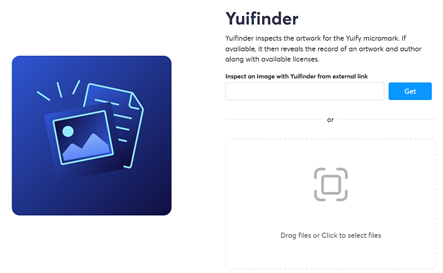 |
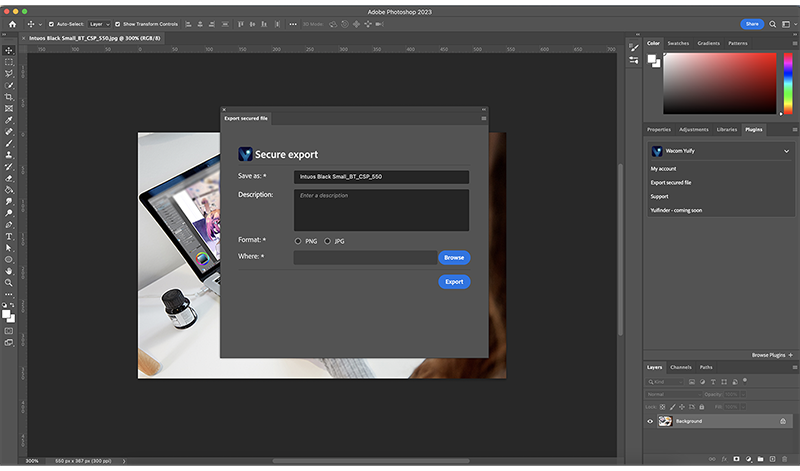 |
What was the motivating factor behind developing Wacom Yuify?
Avinav: The driving force behind this project stemmed from a desire to enhance the creative process for creators. We thought long and hard about how to cultivate a more favorable environment for creators while safeguarding digital rights. While all this was happening, internal discussions within the company were exploring the possibility of leveraging blockchain technology, which was relatively new at the time in the field of digital rights protection. This was uncharted territory, with only limited data available and just a handful of companies venturing into this domain.
On the other hand, we were acutely aware of the demands coming from Wacom users who were voicing their needs for such a service. Considering these circumstances, we put together a team, and together we embarked on researching and exploring new technologies. The absence of competitors in this field and the pressing issue faced by creators, which up until that point still hadn’t been solved, served as a potent motivating factor for us to embark on this journey.
Please tell us more about the team behind the project.
Ryoji: We are working in a cross-functional and cross-regional team, which we refer to as the ETC team. Our approach is primarily shaped by regional considerations, taking into account the unique needs and creative practices of our users. Avinav focused on developing services tailored to the European user base, while my focus was on the Japanese market. However, we are working together very closely and leveraging the specific strengths of each region. My primary role involves partnering with CELSYS, Inc., to develop and provide services customized for the Japanese audience.
Avinav:
Just as Ryoji explained, we function as a cohesive ETC team while each region spearheads its respective initiatives forward. Our geographical distribution plays a significant role in our team structure. For instance, the application development team is in Bulgaria, the technology team operates from the UK, and the legal team is situated in Japan. This configuration allows us to work together with flexibility while nurturing seamless cooperation.
Wacom Yuify ETC has diverse backgrounds. How did you come to join the project?
Roji: My involvement was somewhat unique. Initially responsible for Business Finance & Analysis, I participated in a meeting that was discussing the software technology roadmap and digital rights management when the topic of this new technology came up. By sheer coincidence, I happened to know a Japanese startup who specialized in this area. I introduced the startup to a manager in the Ink Division, which ultimately led to me joining this project.
Avinav: My participation also came from a fortuitous internal conversation. Just before the project was launched, we conducted a workshop on SSI using DID technology where we started to explore digital rights protection. It was from these initial steps that the Wacom Yuify project was born.
How far along have things progressed so far?
Avinav: That’s a difficult question to answer. To gauge our progress, especially in terms of the user interface (UI), I'd estimate we're around 60% finished. While the service isn't quite flawless yet, we believe it already offers significant value. Legal concerns and various constraints exist due to the evolving nature of the technology, but we're dedicated to refining its strengths as a service. Unlike hardware, continuous improvement takes precedence over pursuing perfection in the realm of software and services. I believe the remaining 40% hinges on our ongoing efforts. How do you see it, Ryoji?
Roji: I would say that our progress is at around 50%. We've advanced sufficiently to offer a beta version of the service, aligning with our intended goals. The remaining 50% entails the challenges of marketing the service, further development, and ongoing enhancements.
The beta version of Wacom Yuify is available in Europe*. How have users responded?
Avinav: Wacom Yuify was designed with a user-centric approach. To get users involved, we've been actively engaging with them by distributing the beta version and launching workshops to create more platforms for interaction. Through direct feedback gathered during the closed beta tests conducted in Japan, the US, and Europe in 2022, we've learned that Wacom Yuify is indeed a service that users find practical and usable.
Interestingly, we observed some regional variations in user preferences. In Japan, for instance, users showed a strong inclination toward blockchain technology, which enables them to document the background of their creations. Meanwhile, American users displayed more interest in features related to creator identification and rights management. Users' interests spanned various aspects of Wacom Yuify's features, but the good thing is we haven’t received any negative feedback. The overwhelmingly positive responses underscored the value of Wacom Yuify’s service.
In response to this positive feedback, we started distributing an open beta version in Europe last April 2023. The service is currently available to workshop participants, and while our user base isn't large, we are actively formulating plans for its future development.
It's intriguing to note how different regions and cultures have different needs for Wacom Yuify.
Avinav: Indeed, the distinctions arise from both technical and cultural aspects. Technical differences revolve around variations in software interfaces among regions, while cultural disparities encompass divergent perceptions of rights and the importance of creative communities.
Ryoji: When considering regional differences, multiple facets come into play. As Avinav pointed out, we initially expected Japanese users to find value in our service beyond just rights management. During discussions with our partner CELSYS, we recognized the desire to create an engaging service that appeals to a broader spectrum of users, while preserving the importance of protecting and managing creative works. This led us to the idea of not only documenting the rights for each piece, but also capturing its backstory, why it was created, and the emotions invested into it.
More recently, AI image generation has gained considerable attention. While I don't intend to argue for or against AI, I do understand that human creators infuse their works with passion and effort. Their creations are laden with various emotions and thoughts, which, in today's context, holds immense value. I believe that documenting a work's background with Wacom Yuify is very meaningful and important.
Has the surge in interest around generative AI had an impact on the development of Wacom Yuify?
Avinav: The emergence of generative AI as a prominent trend in the creative industry has evolved rapidly in recent years. While it wasn't that we lacked interest in this area, the rise of generative AI coincided with the ongoing development of Wacom Yuify. In my honest assessment, the timing of Wacom Yuify's emergence may have contributed significantly to the attention it received, as it coincided with the growing interest in AI. This immediately sparked a lot of interest across social media platforms in Europe. Conversations around generative AI were already circulating within creative communities, and it has been one of the key topics. We received comments from various creators, expressing the belief that Wacom Yuify could serve as evidence of human creation, highlighting the high expectations associated with our service.
Regarding AI, there are diverse opinions, with some expressing support while others harbor concerns. It's worth noting that, at this point in time, AI cannot solve all of humanity’s challenges. I believe creators are closely monitoring the future of AI amidst these differing viewpoints. In our discussions about AI, we aim to strike a thoughtful balance. We remain vigilant in observing how the world evolves as AI becomes more widespread.
Ryoji: Our hope is to enable creators to continue their work peacefully and comfortably, relishing in the joy of their creations. This vision aligns with Wacom's commitment to "Life-long Ink," and we aspire to support creators in their creative journeys for a long time to come.
Could you share your goals for Wacom Yuify?
Avinav: I have a very clear vision in mind. I want to create a world where all pieces of work are documented in Wacom Yuify and anyone can easily identify the creator. This would eliminate the need to search for creators' names through internet image searches and alleviate creators' apprehensions about sharing their artworks. Moreover, if Wacom Yuify can authenticate creators' works, it would become more challenging for their creations to be misused.
Ryoji: That is a remarkable vision. In the short term, my goal is to successfully launch Wacom Yuify as a service and gain recognition for it as our new business, which is something I'm actively working on. It's important to emphasize that Wacom Yuify is not a project done by Wacom alone; it involves various partners to make it all happen. The process of aligning diverse entities for the purpose of working towards a common goal is more challenging than I initially imagined. This project has been a significant learning experience for me, presenting numerous challenges. While the success of Wacom Yuify itself is a tremendous source of motivation, my own lessons learned and growth through this project are equally vital to me.
Avinav:
I can't wait to introduce Wacom Yuify to creators. In the conversations we’ve had with creators from different backgrounds, we were able to gain valuable insights into the challenges they encounter concerning digital rights. It’s truly heartening to know that the solutions offered by Wacom Yuify are not simply to generate sales for the company, but genuinely help protect the digital rights of creators.
What challenges do you foresee for Wacom Yuify as you embark on the next steps?
Avinav: We believe that we need a comprehensive ecosystem of processes to achieve our goal. As Ryoji mentioned, we need to cooperate with many different partners to make Wacom Yuify a reality. Each party brings its unique interests, business goals and priorities to the table, and collaboration takes a lot of time. While this project presents considerable challenges, we are confident that we are moving in the right direction. I firmly believe that our team is well-equipped to embrace and overcome all the challenges that come our way.
Ryoji: I share that sentiment. I believe that Wacom Yuify will deliver very meaningful experiences to our customers if we can execute it in alignment with our ultimate vision.
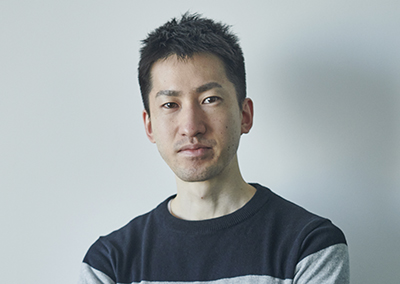 |
 |
| Ryoji Ishii | Avinav Khanal |

Reflecting on the Last Five Years: Progress and Future Trajectories of Social Initiatives
We will reflect upon our five-year journey with CEO Nobu Ide about the intention to connect the future of Social Initiatives with our Meaningful Growth.

Our Sparks. “Focus: The Autistic Superhero Loves Comic Art!” by Yvonne Wan
Discover the inspiring works of community creators who collaborate with us. Today, we feature “Focus: The Autistic Superhero Loves Comic Art!” by Yvonne Wan.

"CREATE Program" Expanding Future Possibilities and Connecting Hopes
Wacom Canada has been involved with the "CREATE Program" at Sisler High School as a partner to support students who want to embark on career paths in the creative industry.

Our Sparks. “Join The Journey” by Arian Rahmatzai
The 'Our Sparks.' pages showcases community creators whose works inspire and collaborate with us. This time features Arian Rahmatzai's artwork, a German talent who interned at Wacom.
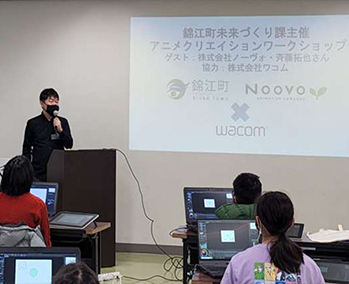
Supporting Children's Dreams of Becoming Creators - 1: Initiatives with Kinko Town
The aspiration of children who dream of becoming creators is what ignites our team members’ enthusiasm and drives many of our initiatives. One such initiative involved teaming up with an animation workshop in Kinko Town, Kagoshima Prefecture, Japan.
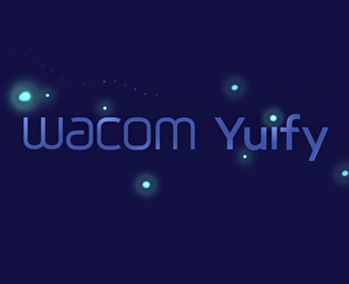
Wacom Yuify: Making the world a safer place for creators
Wacom Yuify is an innovative service being developed to authenticate creators' works by embedding invisible micro-marks into artworks and, therefore, addressing unique needs across various regions and cultures.
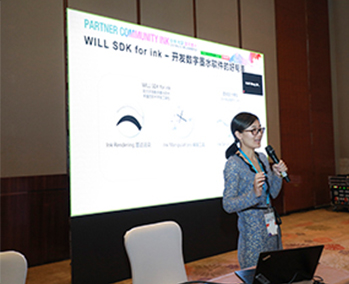
Initiatives in China – Bringing Digital Ink Technology to More People
Lannie Zhang, the only product manager in the Ink Division in China, took the time to talk to us about the initiatives planned to increase awareness and promote the use of digital ink technology.

Our Sparks. “At the beach in the early afternoon” by sammy
We would like to introduce the artworks by artists in Oiso Town, Kanagawa, Japan, where we have been working together to support the writing/drawing initiative.

Wacom Experience Center - A space for everyone to be creative
The Wacom Experience Center Portland was created for people to interact with the creative community in the city. We took a look back at its growth with Megan Davis, who has been playing an energetic role there.

Connected Ink 2022: What happens here is everything
Connected Ink 2022 opened with two key questions. Let’s take a look back at some of the sessions in Tokyo that explored them.
Read More
Our Sparks. “Wind Carrying Light” by Syuro
We would like to introduce the artworks by artists in Oiso Town, Kanagawa, Japan, where we have been working together to support the writing/drawing initiative.
Read More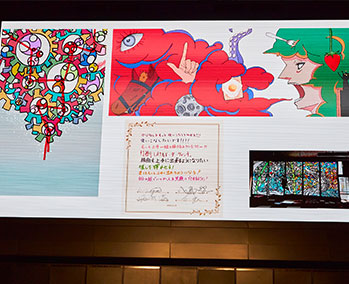
How can we support the “writing/drawing" initiative with Oiso Town?
The partnership with Oiso Town has developed into a city-wide initiative. We spoke with Tadakuni Tsubota of the Creative BU Retail Partnership about this initiative.
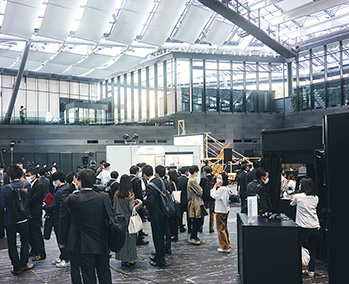
A side of the Connected Ink polyhedron - 2
How do team members see Connected Ink? The next team member is Yohei Himori who is involved in the planning and operation of Connected Ink together with Heidi.

A side of the Connected Ink polyhedron - 1
How do team members see Connected Ink? The first team member is Heidi Wang who has played a key role in the planning and operations when it all began in 2016.

How can we overcome barriers that exist in society? / Call & Response
In collaboration with Heralbony Inc. and the General Incorporated Association, Connected Ink Village, Wacom launched a new initiative called "Call & Response” in September 2021.
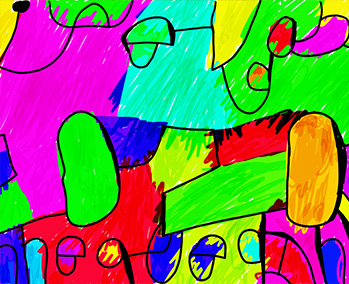
What Lingers in the Afterglow / Connected Ink 2021
Here’s a look back at the opening and finale of the nearly 70 sessions held that day and reflect upon what has happened since Connected Ink 2021.

Our Sparks.
“The spark of love” by Jacky Yang
Our sparks meet constantly changing situations, unexpected challenges, and new opportunities. We called on our team members again to show how they see their spark in the world of today and the future.
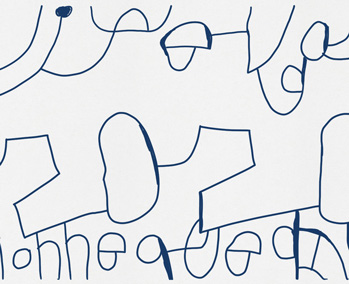
Keep asking questions and moving forward / Connected Ink 2020
Connected Ink 2020 was the beginning of a new commitment and challenge for Wacom to continue asking those eternal questions that always play in our minds.
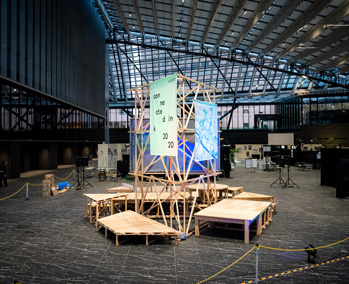
“Stage KOPPA”, a stage that connects stories
"Stage KOPPA" was created as a stage for Connected Ink 2020. It is a stage that changes its shape and role in response to different situations while connecting the various stories that occur there.

Our Sparks.
“Mam and Dad’s Child Interest” by Stella Wang
“Mam and Dad’s Child Interest” by Stella Wang
Our sparks meet constantly changing situations, unexpected challenges, and new opportunities. We called on our team members again to show how they see their spark in the world of today and the future.

Our Sparks.
"A moment on an autumn mountain" by Takahiro Yamamoto
"A moment on an autumn mountain" by Takahiro Yamamoto
We had an internal art contest for our Social Initiatives. Let us share the existence of the spark in our team members’ hearts with their artworks.

Online drawing class for elementary school students during stay-at-home period
Yoshinori Mita, a team member of Japan held an online drawing class together with FC KAZO and illustrator Suiiro to provide something fun for elementary school children to do during the COVID-19 stay-at-home period.
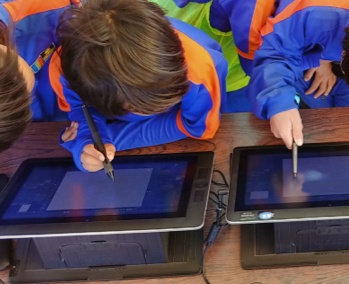
Wacom's new initiative through soccer
As an official partner, Wacom supports FC KAZO, a soccer club in Kazo City, Saitama Prefecture, Japan. We’re excited to introduce our new initiatives with this inspiring club.
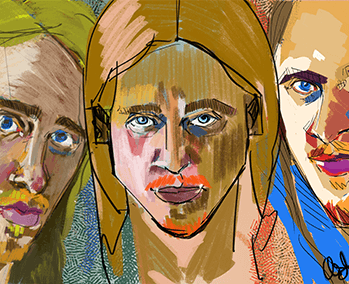
Our Sparks.
"The spark is in you! Mirror portraits during times of isolation" by Oliver Madlener
"The spark is in you! Mirror portraits during times of isolation" by Oliver Madlener
We had an internal art contest for our Social Initiatives. Let us share the existence of the spark in our team members’ hearts with their artworks.

Online Sketchnoting workshop for children during school closures
Our team members in Germany organized an online workshop “Young Wacom” for the children while schools were closed due to the COVID-19 pandemic.
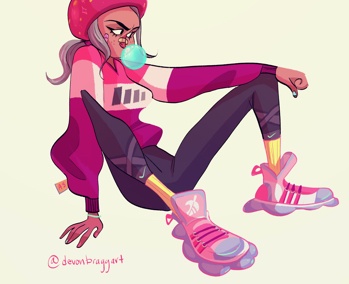
Support the "lives" of artists through customer support
Alex Duffey from our Americas Support team established a new program to support artists. We asked him about a story with Ms. Devon Bragg, the artist who inspired him to establish this program.

3. How KOPPA began /
The story of the Traveling KOPPA
The story of the Traveling KOPPA
KOPPA began in April 2019. Tamotsu wanted to make something that can be used again after an exhibition. We asked Team KOPPA about their thoughts.

2. No need to destroy it anymore /
The story of the Traveling KOPPA
The story of the Traveling KOPPA
We put it together ourselves, set it up, put it back, then travel together again. The Traveling KOPPA, our new display furniture came to be.

1.Meeting KOPPA /
The story of the Traveling KOPPA
The story of the Traveling KOPPA
KOPPA started out as a challenge: Tamotsu Ito, an architect from Japan, wanted to utilize leftover building materials. Our meeting was pure happenstance.

Our Sparks.
“That Spark Inside” by Simone Wolters
“That Spark Inside” by Simone Wolters
We had an internal art contest for our Social Initiatives. Let us share the existence of the spark in our team members’ hearts with their artworks.
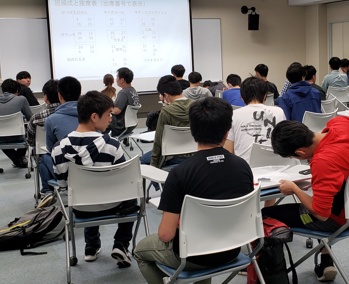
Marketing lecture for future engineers
We gave a marketing lecture for students who are learning to be engineers at the National Institute of Technology Tokyo College.
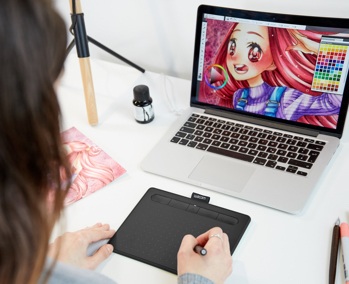
Efforts by our sales member, who are responsible for a pen tablet until the very end
Every year, we take pen tablets that have been sitting in our warehouse and gift them to high school clubs and winners of high school art competitions to help students create digital contents.
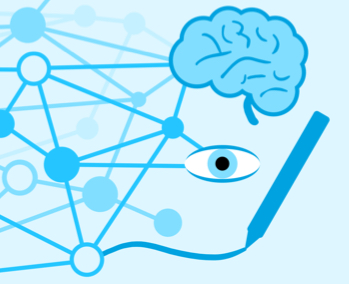
For the Future of Education
Lifelong Ink x AI
Lifelong Ink x AI
"AI Ink for Education" was developed to capture eye movement information and pen movements while learning, in order to ascertain the characteristics of learning by each student and to create an educational environment suited to each student.
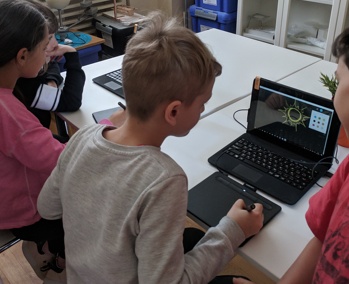
Wacom Intuos have been introduced in a school to make classes more fun and creative
Yoana Simeonova, a software designer working in Bulgaria, introduced Wacom Intuos in a school to make children's IT classes more fun.



























